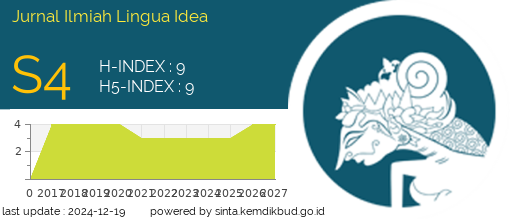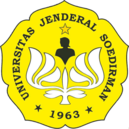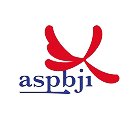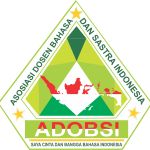“Stress Role Overload Model” towards Work Family Conflict and Teachers Performance
Abstract
This research was conducted to determine the factors that affect the stress role overload that occurs in women teachers who have experienced work family conflict and impact on the performance of teachers in school. Data collection is done empirically through teachers in some of the state high School of Banyumas and Banjarnegara district. The research approach used is a quantitative approach. Data collection conducted with survey questionnaire and purposive sampling method. The sample criteria is (1) The respondent must be married, (2) The respondent has a child, (3) is a dual career pair/have a partner who also works. The result of the spread of sample questionnaire that deserves to be processed and analysis amounted to 134 respondents. The research approach utilizes an in-role-performance approach and an extra-role-performance testing Model and hypothesis using the Structural Equation Model (SEM) equation analysis technique. The results showed that role overload has positive effect on teacher performance, family support has positive effect on teacher performance, teacher certification positively affects teacher performance and work family conflict does not affect in-role-performance or extra-role-performance.
References
Anis, Indah dkk. (2003). Pengaruh Kepuasan Kerja dan Komitmen Organisasional terhadap Keinginan Pindah Kerja Auditor (Studi Kasus pada KAP di Jawa Tengah). Jurnal EKOBIS, Vol. 4, No. 2.
Arbukle, J.L. (1997). Amos User’s Guide Version 3.6. Chicago: Smallwaters Corporation.
Arfah, A., Anshori, M. (2005) Pengaruh Kesesuaian Kompensasi terhadap Kinerja dan Kepuasan Kerja Karyawan (Studi pada Karyawan Perusahaan Air Minum di Batam, Majalah Ekonomi. Vol XV. No. 3A.
Augusty, F. (2013). Structural Equation Model dalam Penelitian Manajemen. BP Undip: Semarang.
Bandura, A. (1991). Self Efficacy Mechanism in Psychological and Health-Promoting Behavior. New Jersey: Prentice Hall.
Bowen, D. E., Lawler III, E.E. (1992). The Empowerment of Service Workers: What, Why, How and When. Sloan Man Review: Spring.
Cruickshank, D.R. (1990). Research that informs teachers and teacher educators. Bloomington: Phi Delta Kappa Educational Foundation
Debora. (2006). Pengaruh Pemberdayaan Psikologis dan Kerja terhadap Kepercayaan Organisasional dan Kepuasan Kerja Dosen Tetap Perguruan Tinggi Swasta. Jurnal Manajemen Petra Vol. 8, No. 2.
Depdikbud. (1991/1992). Hasil Rapat Kerja Nasional Depdikbud Tahun 1991. Jakarta
Departemen Pendidikan Nasional. (2004). Pengembangan Perangkat Penilaian Kinerja Guru. Jakarta: Ditjen Dikti, Bagian Proyek P2TK
Engko, C. (2006). Pengaruh Kepuasan Kerja terhadap Kinerja Individual dengan Self Esteem dan Self Efficacy sebagai Variabel Intervening. Simposium Nasional Akuntansi 9 Padang.
Gibson, J., Ivancevich, J.M., Donnelly, J.H. 2000. Organizations. Boston: McGraw-Hill Companies, Inc
Handoko, H. (2001). Manajemen Personalia dan Sumber Daya Manusia. Yogyakarta: BPFE Universitas Gajah Mada.
Hair, J. F., Anderson, R. E., Tathom, R. L., and Black, W. L. (1995) Multivariate Data Analysis (Fourth Edition). New Jersey: Prentice Hall Inc.
Khan, S. (1997). They Key to being a Leader Company: Empowerment, Journal Personality and Partisipation, p.44-45.
Koberg, C.S, Boss, R.W., Seryem, J.C, Goodman, E.A. (1999). Antecedent and Outcomes of Empowerment: Empirical Evidence from the Health Care Industry, Group and Organization Management. Sage Publications, Vol.24, p.71-91.
Kreitner, R., Kinichi, A. (2005) Organizational Behavior. New York: McGraw-Hill Companies, Inc.
Lee, C., Bobko, P. (1994). Self Efficacy Belief: Comparison of Five Measurement. Journal of Applied Psychology. Vol: 79, p: 364-369.
Listianto, T., Setiaji, B. (2004). Pengaruh Motivasi, Kepuasan Kerja terhadap Kinerja Karyawan (Studi Kasus di Lingkungan Pegawai Kantor PDAM Surakarta). Jurnal Bisnis dan Kewirausahaan, Vol. 4, No. 1.
Luthans, F. (1998). Organizational Behavior, Eleventh Edition. Singapore: Mc Growth-Hill Book Co.
Masrukin, Waridin. (2006). Pengaruh Motivasi, Kepuasan Kerja, Budaya Organisasi dan Kepemimpinan terhadap Kinerja Pegawai. EKOBIS, Vol. 7, No. 2.
Nana Sudjana. (2002). Dasar-dasar proses belajar mengajar. Bandung: Sinar Baru
Ormrod, J.E. (2003). Educational Psychology, Developing Learners (4d ed.). Merrill: Pearson Education, Inc.
Supriadi, D. (1999). Mengangkat Citra Dan Martabat Guru. Yogyakarta: Adicita Karya Nusa
Authors who publish with Jurnal Ilmiah Lingua Idea agree to the following terms:
- Authors retain copyright and grant the journal right of first publication with the work simultaneously licensed under a Creative Commons Attribution License (CC BY-SA 4.0) that allows others to share the work with an acknowledgment of the work's authorship and initial publication in this journal.
- Authors are able to enter into separate, additional contractual arrangements for the non-exclusive distribution of the journal's published version of the work (e.g., post it to an institutional repository or publish it in a book), with an acknowledgment of its initial publication in this journal.
- Authors are permitted and encouraged to post their work online (e.g., in institutional repositories or on their website) prior to and during the submission process, as it can lead to productive exchanges, as well as earlier and greater citation of published work.





















.png)






